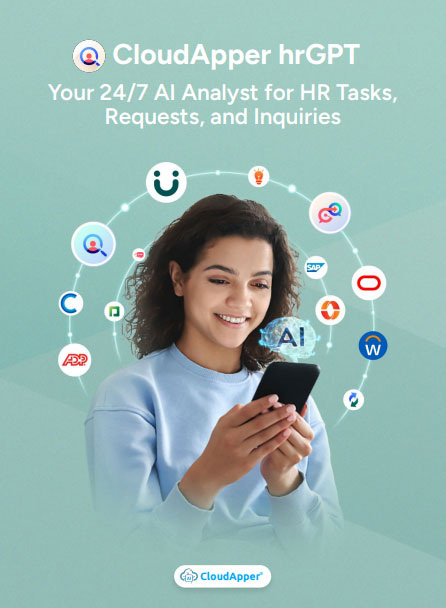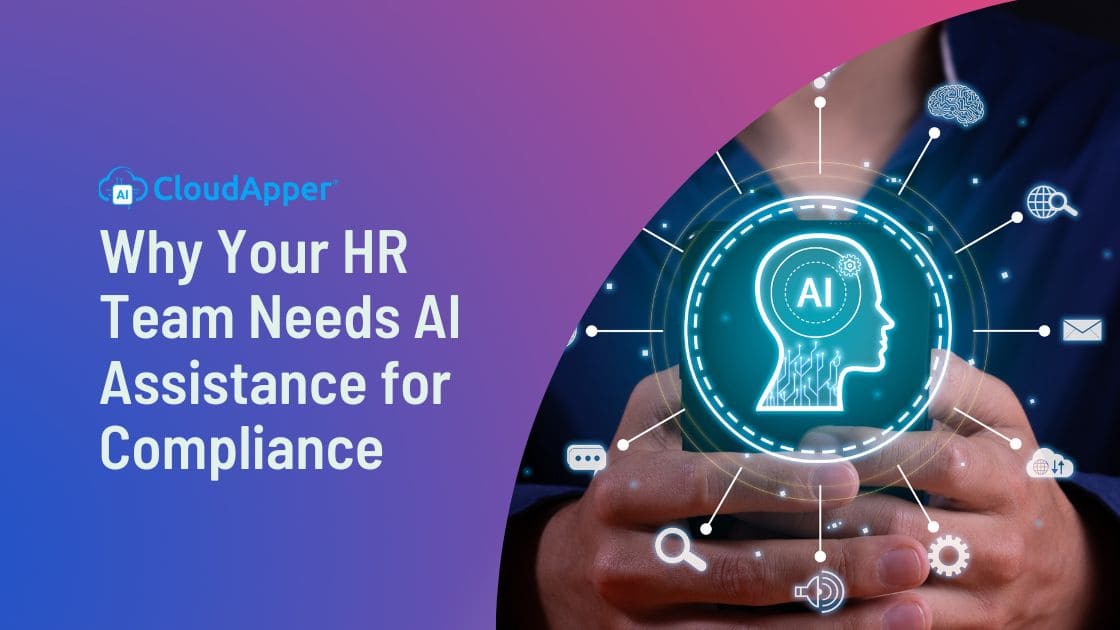CloudApper hrGPT empowers HR teams with AI assistance for streamlined compliance. Real-time updates, knowledge repository, self-service checks, and error reduction enhance HR efficiency and ensure regulatory perfection. Compliance is no longer a burden with hrGPT.
Table of Contents
Compliance is paramount in the ever-changing field of human resources (HR). Human resources experts have a massive obligation to ensure that their companies follow all applicable labor laws, industry regulations, and internal standards. The consequences of noncompliance can be severe, including legal difficulties, penalties, and a damaged reputation. Due to the high stakes involved, HR departments can benefit greatly from incorporating AI into their processes.
The Role of HR in Compliance
Human resources departments are the watchdogs of a corporation when it comes to upholding regulations. They are responsible for understanding the myriad of labor laws at the federal, state, and municipal levels and ensuring that organizational policies are consistent with these laws. Equal employment opportunity, pay and hour rules, workplace safety, and anti-discrimination legislation all require strict adherence to the law.
Challenges in Compliance
While HR teams understand the significance of compliance, they often face several challenges:
Dynamic Regulations: Changes are frequently made to the rules and legislation governing the workplace. On a regular basis, both new laws and changes to existing ones are passed. Keeping up is a very difficult task.
Administrative Burden: Human resources specialists have little time for strategic initiatives because they are so busy with administrative work.
Human Error: Human mistake is inevitable in manual operations, which can lead to noncompliance issues.
Policy Dissemination: It might be difficult to make sure everyone at your firm knows and follows the rules.
The AI Revolution in HR Compliance
CloudApper hrGPT is an AI assistant that helps with HR policies and procedures. Help your HR department find their way through the regulatory jungle with our cutting-edge AI-driven application. Why your HR department needs AI help with compliance
1. Real-Time Updates:
hrGPT can be auto trained to gather knowledge about the legislative environment by uploading compliance documents. It can also be regularly revised to reflect any changes in applicable regulations. This will keep your HR department up-to-date and guarantee compliance with all relevant regulations.
2. Accessibility and Availability:
Unlike regular HR departments, hrGPT is always open for business. If an employee has a question about compliance, they may look it up and get an answer immediately. Because of this, compliance isn’t restricted to normal business hours.
3. Knowledge Repository:
Compliance-related information may be found in hrGPT. It is a centralized repository for all relevant papers, policy guidelines, and industry laws.
4. Self-Service Compliance Checks:
hrGPT allows workers to conduct their own compliance audits at their convenience. Employees may type in their questions and hrGPT will provide tailored answers that will educate them on their legal protections and obligations.
5. Enhanced Policy Dissemination:
Policy communication is simplified using hrGPT. Using this system, you can make sure all of your workers have received policy materials, are up to date on changes, and have submitted appropriate attestations.
6. Reduced Administrative Burden:
HR professionals are able to devote more time to strategic initiatives like talent management and employee engagement because to hrGPT’s automation of administrative duties linked to compliance.
7. Error Reduction:
Unlike humans, AI rarely makes mistakes. The potential for human-caused compliance infractions may be mitigated with the use of hrGPT’s information validation and survey features.
8. Seamless Integration:
Human resource management (HRM) platforms such as UKG, ADP, Oracle HCM, SAP SuccessFactors, Workday, Ceridian Dayforce, Paycom, BambooHR, PeopleSoft, and more may be integrated with CloudApper hrGPT without any disruption to the user experience. In this way, you can count on the same HR service across all of your preferred platforms.
9. Cost-Effective Compliance:
The cost of conformity need not be prohibitive. Since hrGPT streamlined compliance procedures, cuts down on administrative costs, and lessens the likelihood of noncompliance, it is a relatively inexpensive option.
10. Empowered Employees:
With hrGPT, workers may take accountability for their own compliance efforts. Self-service alternatives allow them to get the answers they need, which raises compliance rates in general.
11. Data-Driven Insights:
By collecting and evaluating information on compliance questions and problems, hrGPT equips HR departments with the knowledge they need to tackle compliance issues head-on and put safeguards in place.
Conclusion
Human resources departments cannot afford to depend entirely on manual operations in today’s highly regulated environment. CloudApper hrGPT is a potent assistant in the fight for regulatory perfection. It’s an AI analyst that works around the clock, knows all the rules, and streamlined compliance procedures while cutting down on paperwork. Your HR department can confidently stay on the right side of the law and avoid costly errors with the help of hrGPT’s comprehensive compliance management system.
You shouldn’t view compliance as a difficult task. Take advantage of CloudApper hrGPT’s AI help and equip your HR department to succeed in a world of ever shifting rules & regulations. As an integral component of your HR strategy, compliance is no longer a burden.
What is CloudApper AI Platform?
CloudApper AI is an advanced platform that enables organizations to integrate AI into their existing enterprise systems effortlessly, without the need for technical expertise, costly development, or upgrading the underlying infrastructure. By transforming legacy systems into AI-capable solutions, CloudApper allows companies to harness the power of Generative AI quickly and efficiently. This approach has been successfully implemented with leading systems like UKG, Workday, Oracle, Paradox, Amazon AWS Bedrock and can be applied across various industries, helping businesses enhance productivity, automate processes, and gain deeper insights without the usual complexities. With CloudApper AI, you can start experiencing the transformative benefits of AI today. Learn More

CloudApper AI Solutions for HR



- Works with








- and more.
Similar Posts

Best Practices for AI in Workforce Management: What Every HR…

Why HR Process Automation is the Future of Workforce Management








